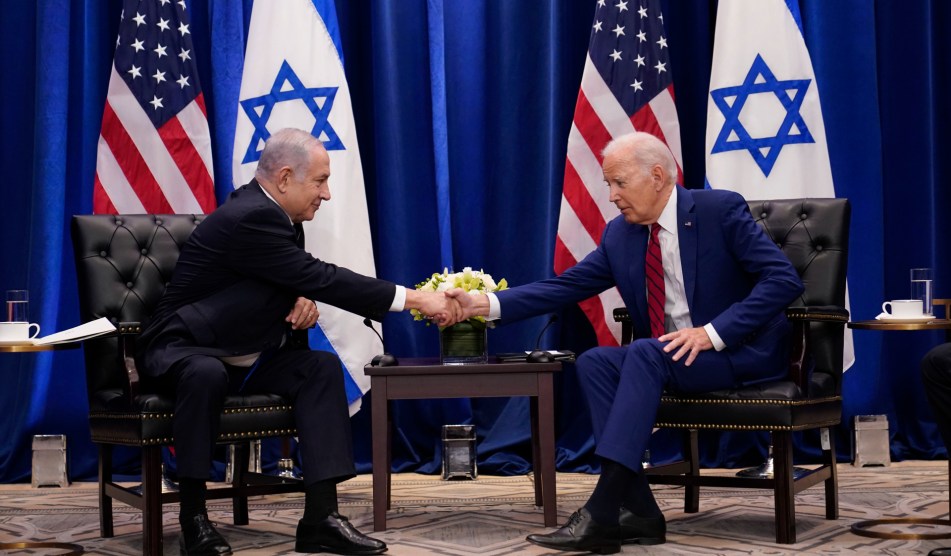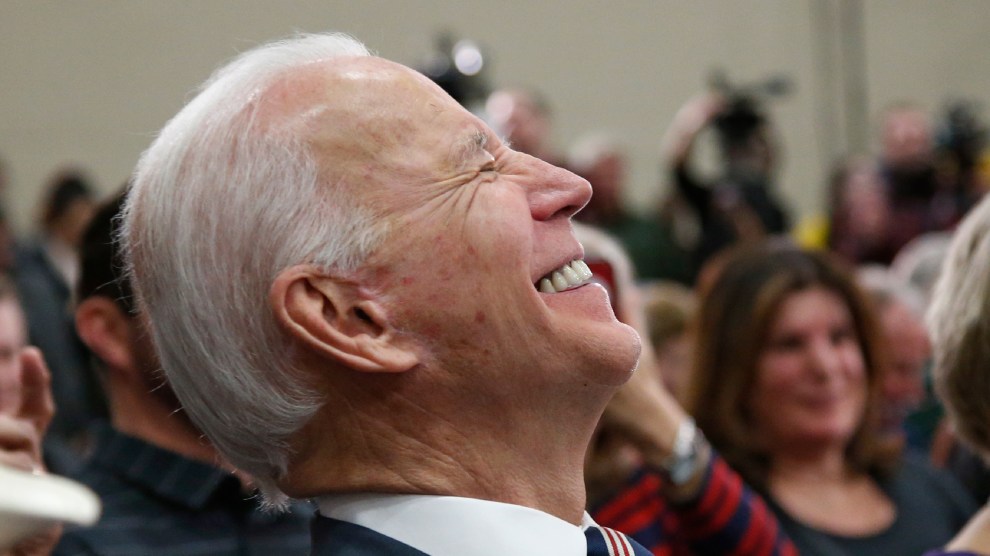
President Joe Biden meets with Israeli Prime Minister Benjamin Netanyahu in New York in 2023.Susan Walsh/AP
Using a “wave of attacks” this weekend, Israel bombed Rafah—a southern city in Gaza holding more than 1 million displaced people—killing dozens. The reason? The Israeli government said it was, at least in part, to provide cover for a military operation that successfully liberated hostages. The calculus is haunting: Israel killed 67 people to free two people.
With over 27,000 killed in Gaza already, Israeli Prime Minister Benjamin Netanyahu has not publicly backed down from an aggressive war effort—begun in response to the October 7 attack that killed over 1,200 people—even as the deaths mount. “Only continued military pressure until total victory,” Netannyahu said after the operation in Rafah, according to the Guardian, “will bring about the release of all of our hostages.”
So far, the United States government has mostly backed the war, despite mounting criticism. For years, as my colleague Noah Lanard reported, President Joe Biden has been fiercely pro-Israel—and even more hawkish than the typical Democrat. But there are tiny indications of a potential change. Last week, Biden in a press conference said the Netanyahu government’s response in Gaza was “over the top.” In recent days, as Israel has prepared for a ground invasion of Rafah—drawing heavy international criticism—the administration has, at least in leaks to the press, said it is asking for much clearer plans from Israel.
But much of this seems to just be talk. Or, if it is not, Netanyahu has made no public statements that would indicate he is changing course. Netanyahu told ABC’s “This Week” that the only two options available to Israel are to either enter Rafah or to “lose the war.” Last week, he called a ceasefire proposal from Hamas “delusional.”
It’s hard to square all the reporting about Biden supposedly taking a harder line with actual US policy. As Matt Duss—the executive vice president of the Center for International Policy and a former foreign policy adviser to Sen. Bernie Sanders—points out, such warnings are “meaningless” when the United States shows no signs of “consequences for anything Israel does.”
When I called Duss to ask him if the “over the top” statement by Biden should be seen as a legitimate pushback to Netanyahu he said: “I can’t take that seriously. I’m sorry. You’re still delivering the weapons. You’re still enabling this massacre. That is what matters.”
Since Biden has repeatedly made clear that there will be no consequences for anything Israel does, this is a meaningless warning. Its sole point is to generate tweets like the one below, so people can say there’s “private pressure” and feel better about supporting atrocities. https://t.co/Y2zIAZSzQc
— Matt Duss (@mattduss) February 11, 2024
The private pushback, Duss continued, isn’t compelling when the impacts of it are clear. “The message is: Oh, he’s putting pressure in private. And my response to that is: How’s that going?” Duss told me. “They turned Gaza into the moon. You have almost 30,000 people killed; almost 2 million people displaced. Whatever Biden is saying in private, what he’s doing in public is sidestepping Congress to rush more ammunition to Israel. That’s the message. That’s the policy.”
Duss said that what is occurring now in Rafah makes it clear that Biden’s diplomatic approach does not seem to be having an impact on Israel’s behavior: “How much is enough? Is there actually a red line? Is there actually a number of dead Palestinian children that is too much? Thus far the answer is no.”
As the war unfolds, there has been some movement by some Democrats in response to the mounting horror. Sanders—despite reticence to call for a ceasefire—has become more vocal about the war, pushing to impose conditions on aid to Israel. And last week the Biden administration put out a memorandum, NSM-20, requiring written confirmation from foreign governments receiving arms transfers that humanitarian law is being followed.
But, as critics pointed out, there are already policies against war crimes. The provisions of NSM-20, as Duss told me, are a step forward in that the Biden administration is publicly saying it is unwilling to send military aid to a country committing atrocities. But “if they really wanted to uphold US legal commitments and international legal commitments around military force, we don’t need this new layer of paper,” Duss said. They can just enforce laws and policies already in place.
For now, it seems we are stuck in the same cycle. Early today, NBC News reported that behind the scenes Biden has repeatedly called Netanyahu an “asshole” standing in the way of peace. And, at the same time, the administration is pushing for $14.1 billion in military assistance to Israel, which does not include many conditions for how it is used or strong provisions for transparency.
As Lanard reported previously for us, the dynamic makes clear US priorities:
“The administration’s rhetoric is slowly shifting, but the world is seeing [America’s] actions,” the podcast host and former Obama National Security Council spokesperson Tommy Vietor said last week. “It kind of doesn’t matter what Biden says at a closed-door fundraiser.” The world sees the Biden administration vetoing a UN ceasefire resolution that only 10 out of 186 nations opposed, bypassing Congress to get tank shells to Israel more quickly, and maintaining “unshakeable” support for a nation multiple human rights groups in and outside of Israel—as well as a former head of the Mossad—have concluded forces Palestinians to live under a system of apartheid.
“So long as you are supporting Netanyahu’s military operation in Gaza without condition, it makes absolutely no difference how much you turn the dial in your comments,” Ben Rhodes, who served as deputy national security adviser to President Obama, told the Washington Post. “Fundamentally, you have to make a decision not to give [Netanyahu] a blank check of support.”
















